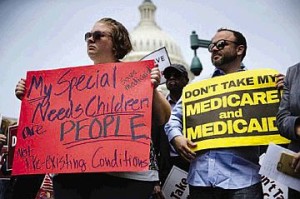
Activists rally in front of the Capitol in Washington to urge the Trump administration not to replace Obamacare, also knwon as the Affordable Care Act.
/AFP
WASHINGTON—In 1944, president Franklin Roosevelt urged Congress to pass a “second bill of rights.” Number six on the list was “the right to adequate medical care and the opportunity to achieve and enjoy good health.”
Seventy-three years later, despite the passage of many health care reforms, his dream remains as controversial as it was back then.
Under former president Barack Obama, more than 20 million previously uninsured Americans gained health care coverage.
Those who would have once had to sell their homes to pay for cancer treatments or limited doctors’ visits because of the cost gained at least some peace of mind.
But in the land of rugged individualism, health care has never attained the status of fundamental right, unlike education.
Health insurance is simply a product like any other, say Republicans who, under the leadership of President Donald Trump, are trying to repeal most of Obamacare, the landmark law signed in 2010.
After World War II, the idea of national health insurance supported by Roosevelt’s successor Harry Truman ran into the new geopolitical reality. Opponents called it “socialized medicine.”
“It’s the beginning of the Cold War, we’re terrified of Stalin and Communism.
The word socialism carried a lot of baggage,” University of Michigan medical historian Howard Markel said. “Truman wrote in his memoirs that it was one of the most disappointing political defeats of his career.”
Most Americans receive health insurance from their employers, under a system in which workers are covered by an arrangement largely negotiated directly between employers and trade unions.
“If you look at the systems in France, Germany and Britain, there was an architect of the system,” said Melissa Thomasson, a professor of economics at Miami University in Ohio./